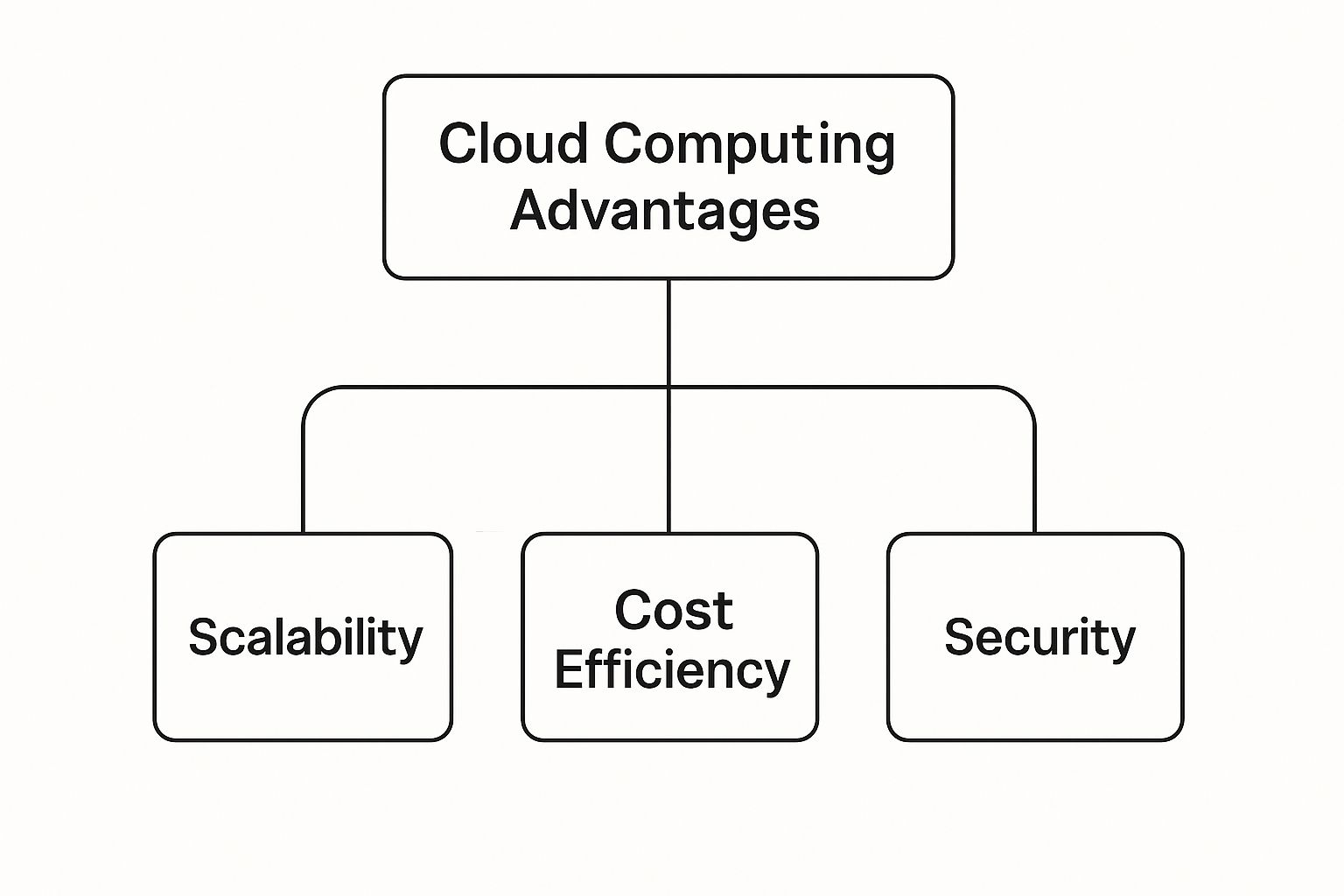When you boil it down, the main perks of cloud computing are some serious cost savings, fantastic flexibility and scalability, and the ability to tap into enterprise-grade technology and security. It's a shift away from buying and managing your own expensive servers, letting you rent computing power from an expert provider over the internet instead.
What Exactly Is Cloud Computing?
Before we dive into the benefits, let’s get a clear picture of what "the cloud" actually is. Don't think of it as some fluffy thing in the sky. It's much more like a utility service, similar to your electricity supply. You wouldn't build your own power plant just to run your office; you simply plug into the national grid and pay for what you use.
Cloud computing works on that same simple principle. You access services like servers, storage, databases, and software over the internet from a provider such as Amazon Web Services (AWS) or Microsoft Azure. This completely changes how you manage your IT budget, moving away from big, upfront capital investments towards predictable, ongoing operational costs.
This change alone opens up a world of advantages for businesses of all sizes. Suddenly, things like scalability, cost-efficiency, and top-tier security aren't just for the big players with huge budgets.
The image below breaks down the core pillars of what makes the cloud so beneficial.

As you can see, cost-efficiency, scalability, and security form the foundation from which all the other advantages spring.
To really grasp the difference, it helps to see a direct comparison. Here's a table that lays out how cloud computing stacks up against the old-school way of doing things with on-premise servers.
Comparing Cloud Computing to On-Premise Servers
| Feature | On-Premise Infrastructure | Cloud Computing |
|---|---|---|
| Initial Cost | High capital expenditure (buying servers, hardware). | Low to no capital expenditure (pay-as-you-go model). |
| Scalability | Difficult and slow; requires buying new hardware. | Easy and fast; scale resources up or down on demand. |
| Maintenance | Your IT team handles all updates, security, and repairs. | The cloud provider manages all hardware and maintenance. |
| Accessibility | Limited to the office network unless complex VPNs are set up. | Accessible from anywhere with an internet connection. |
| Data Security | Your responsibility to implement and manage all security. | Shared responsibility, with the provider securing the infrastructure. |
This comparison makes it clear why so many businesses are making the switch. The cloud model offers a more agile and cost-effective approach to managing technology.
The UK Business Case for the Cloud
Moving to the cloud isn't just a fleeting trend; it’s a solid strategy for running a smarter, more efficient business. In the UK, companies shifting their main systems to the cloud are seeing average cost savings of 30–40%. These savings come from ditching on-site hardware, cutting maintenance bills, and only paying for the resources you actually use.
The numbers speak for themselves. With over half of all enterprise IT spending expected to move to the cloud by 2025, it’s obvious which way the wind is blowing. For 64% of SMBs, the cloud is already essential for enabling effective remote work and team collaboration. If you're interested, you can explore more UK cloud statistics to see the full impact on business efficiency.
This financial agility and operational freedom are precisely why the cloud has become a key driver for businesses looking to stay competitive across the UK.
Transform Your Finances with Cloud Economics

One of the most compelling reasons businesses move to the cloud is the way it completely rewires their finances. In the past, scaling up your IT meant facing huge, upfront costs for physical hardware. This is known as Capital Expenditure (CapEx)—think of it as those big, one-time purchases for servers, storage drives, and software licences.
This traditional model locks up significant cash in equipment that starts losing value the moment it's switched on. The cloud turns this entire idea upside down. Instead of buying assets, you switch to an Operational Expenditure (OpEx) model, where you simply pay a predictable, recurring fee for the services you actually use.
It’s a bit like owning a fleet of delivery vans versus just paying a courier when you need to send a parcel. With the cloud, you're only paying for what you need, when you need it. This pay-as-you-go approach is a genuine game-changer for financial agility, as you stop wasting money on idle resources and free up cash to reinvest in what really matters.
From Theory to Reality
Let’s put this into a real-world context. Imagine a UK-based retail startup gearing up for its first big Christmas shopping season. With a traditional setup, they’d have to fork out thousands for servers powerful enough to handle that massive spike in website traffic. But what happens in the quiet months of January and February? Those expensive, powerful servers would be sitting there, largely unused.
With the cloud, that same startup can automatically increase its computing power to handle the festive rush and then, just as easily, scale it right back down afterwards. They only pay for the extra horsepower during that peak period. It’s a smarter way to work, avoiding hefty initial costs and the problem of over-provisioning.
This shift from CapEx to OpEx isn't just an accounting trick; it's a strategic move. It allows a business to align its IT spending directly with its revenue-generating activities, preserving cash flow for growth, marketing, and product development.
Of course, this financial flexibility is a massive advantage, but managing these cloud systems still needs a knowledgeable hand. Many small businesses find that partnering with a provider for outsourced IT support is the best way to maximise their cloud investment without the overhead of an in-house team. This blend of pay-as-you-go infrastructure and expert management lets you focus on running your business.
Scale Your Business Instantly on Demand

How do you prepare for a sudden boom in business without tying up cash in hardware you might not need tomorrow? This is where one of the most powerful features of cloud computing comes into play: its incredible scalability.
Think of it like this: you're an events company in the UK about to launch tickets for a huge summer festival. With old-school, in-house servers, a massive flood of website traffic could easily crash your site, leading to chaos and lost revenue. And let's be honest, guessing that demand perfectly in advance is a shot in the dark.
The cloud changes the game entirely. That events company can simply 'rent' more computing power, memory, and storage to handle the ticket rush for just a few critical hours. As soon as the peak is over, everything scales back down automatically. They only pay for what they used during that short, intense burst of activity.
The Power of Elasticity
This ability to grow and shrink resources on demand is called elasticity. It's the secret sauce that makes the cloud so cost-effective. You can scale up for a big product launch, but just as importantly, you can scale back down during quieter months. For any business with seasonal peaks or unpredictable demand, this is a game-changer.
This dynamic approach gives you a real edge:
- Handle Unexpected Traffic: Your website and apps stay online and responsive, even when you get a surprise surge in visitors.
- Optimise Costs: You stop paying for idle capacity and only spend on the resources you actually consume.
- Improve User Experience: A fast, reliable service keeps customers happy, building trust and encouraging them to come back.
The real competitive advantage here is agility. While your rivals are stuck waiting weeks for new servers to be ordered and installed, a business running on the cloud can roll out a new service or test a new market practically overnight. Suddenly, your IT isn't just a cost—it's a strategic tool for growth.
The demand for this kind of flexibility is undeniable. The UK cloud computing market hit USD 27.48 billion in 2024 and is expected to grow by nearly 15% each year. This growth is being driven by businesses of all sizes who realise that this agility is key to staying competitive. You can read more about the growth of the UK cloud market on imarcgroup.com.
Strengthen Security and Simplify Compliance

There’s a common misconception that keeping your data in the cloud is riskier than storing it on a server in your office. In reality, for most businesses, the complete opposite is true. Getting your head around this is the first step to seeing the real power of cloud computing.
Think of it like this: where would you rather keep your life savings? In a safe under your desk, or in a high-security bank vault with 24/7 guards, advanced alarms, and reinforced walls? For your data, the cloud is that bank vault. It offers a level of security that very few businesses could realistically afford to build and maintain themselves.
Global providers like Microsoft Azure, AWS, and Google Cloud pour billions of pounds into cybersecurity every single year. Their investment covers everything from teams of the world's best security minds to cutting-edge threat detection systems and fortress-like physical data centres.
Built-in Enterprise-Grade Protection
When you adopt a cloud service, you immediately benefit from this immense security investment. It's not just about stopping hackers; it's about building resilience and ensuring your business can keep running no matter what.
This built-in protection often includes:
- Automated Backups: Your critical data is automatically and regularly copied to multiple secure locations. This protects you from accidental deletions, hardware failures, or even ransomware attacks.
- Advanced Threat Detection: Sophisticated AI systems are always on watch, scanning for unusual activity and neutralising potential threats before they can do any harm.
- Data Encryption: Your information is scrambled and made unreadable while it's being stored (at rest) and while it's being sent over the internet (in transit).
Of course, a strong foundation is only half the battle; your own configurations matter immensely. To learn more, it’s worth exploring the common cloud computing security risks and how you can manage them effectively.
For many small and medium-sized businesses, moving to a major cloud platform is the single biggest security upgrade they can make. It passes the heavy burden of infrastructure security to dedicated global experts, freeing you up to focus on your own applications and user policies.
Effortless Compliance for UK Businesses
On top of the raw security, another huge plus for UK businesses is how the cloud helps with compliance. Meeting the strict requirements of regulations like the General Data Protection Regulation (GDPR) can be a real headache, but major cloud providers design their services to make it much easier.
They offer built-in tools that give you granular control over where your data is stored (data residency), who can access it, and how it’s managed. They also make it simple to generate the audit reports you need to prove you're handling data responsibly, saving you time and minimising legal risk.
Here's the rewritten section, designed to sound like an experienced human expert and follow all your requirements.
Work Together From Anywhere, And Keep Your Business Running
Think of the cloud as the central nervous system for a modern, flexible business. It completely removes the need for your team to be chained to a specific desk in a specific building. This is where the cloud truly shines, allowing people to collaborate effectively, wherever they happen to be.
Let's paint a picture. You've got a crucial client proposal due, and the clock is ticking. With cloud-based suites like Microsoft 365 or Google Workspace, your team can jump into the same document at the same time. Your salesperson in Manchester can be fine-tuning the executive summary, while your finance person adds the numbers from their home office, and you review the final draft on your tablet from a coffee shop. Every edit saves instantly, and everyone sees the changes as they happen.
It’s a world away from the old, chaotic method of emailing countless versions back and forth, trying to figure out which one is the actual final draft. The cloud gives you one definitive version, always up to date.
Build a Business That Bends, Not Breaks
Beyond just improving teamwork, the cloud offers something even more fundamental: a safety net. Ask yourself, what would happen if your office had a flood, a fire, or even just a major power cut that lasted for days? If all your critical data and applications are stored on a server in that building, you're not just offline; your business is effectively on hold.
The cloud changes that entire equation.
Business resilience used to be a luxury only big corporations could afford. The cloud levels the playing field, giving any small business a robust, affordable way to protect itself from local disasters. Your data isn't just in your office; it's securely housed in multiple, geographically separate data centres.
So, if the worst happens and your physical office is out of action, it doesn't have to be a catastrophe. Your team can simply pick up their laptops, head home or to any location with an internet connection, and get right back to work. This isn't just about convenience; it's about guaranteeing business continuity, protecting your revenue, and giving you invaluable peace of mind.
Future-Proof Your Business with Cloud Innovation
Adopting the cloud isn't just a fix for your immediate IT headaches; it’s about setting your business up to seize future opportunities. Perhaps one of the biggest benefits of cloud computing is how it unlocks powerful technologies that, until recently, were simply out of reach for smaller companies.
This access truly changes the game. For a small or medium-sized UK business, it means you can tap into the same sophisticated tools as a global corporation, but without the eye-watering budget or a dedicated team of data scientists. The cloud becomes your gateway to advanced tools like Artificial Intelligence (AI), deep data analytics, and the Internet of Things (IoT).
Think about it in real terms. A UK logistics firm could use cloud-based AI to analyse live traffic data, instantly optimising delivery routes on the fly. This simple change could save a fortune in fuel and slash delivery times, making them far more competitive. All of a sudden, the cloud stops being an IT expense and starts looking like a strategic investment in growth.
Making Advanced Technology Accessible to All
At its core, the cloud levels the playing field. It gives your business access to colossal computing power, precisely when you need it – a crucial requirement for handling modern workloads.
The ability to tap into emerging technologies is a key advantage of cloud computing. By 2025, over half of UK businesses plan to increase their spending on cloud-based AI and analytics, showing a clear trend towards using the cloud for a competitive edge.
This push for innovation is a major factor in the UK cloud market's rapid expansion. The demand for scalable, on-demand resources for AI and Machine Learning (ML) is a primary reason why Platform-as-a-Service (PaaS) offerings are expected to grow so significantly. You can find out more about the UK cloud market and AI adoption on mordorintelligence.com.
Making this strategic shift helps your business not just to keep up, but to get ahead of the curve. A well-thought-out plan is essential to ensure the transition is smooth and successful. If you're starting to think about what's next, our guide on how to migrate to cloud services offers practical insights for your journey.
A Few Lingering Questions About the Cloud
Even when you see the clear benefits, it's completely normal to have a few final questions holding you back. It’s a big step, after all. Here are some no-nonsense answers to the most common queries we get from business owners just like you.
Is My Data Really Safe in the Cloud?
Honestly, for most businesses, your data is much safer in the cloud than it is on your own premises. Think about it: major providers like Microsoft and Google pour billions into security. They have teams of experts and multi-layered defences—from physical security at their data centres to advanced encryption and round-the-clock monitoring—that are simply out of reach for a typical SMB.
It's important to remember that you always own your data. The providers just look after it, and they give you the tools you need to stay compliant with UK data protection laws like GDPR.
What’s the Difference Between IaaS, PaaS, and SaaS?
Let's break this down with a simple analogy: making a pizza.
-
SaaS (Software-as-a-Service): This is like ordering a takeaway pizza. It arrives ready to eat, hot and delicious. You don’t worry about the ingredients, the oven, or the delivery. Examples include Microsoft 365 or Salesforce—you just sign in and use them.
-
PaaS (Platform-as-a-Service): This is like buying a pre-made pizza base from the supermarket. You get the foundation, but you add your own toppings and cook it yourself. This gives you more creative control. It’s for developers who want a platform to build their own applications without managing the underlying servers.
-
IaaS (Infrastructure-as-a-Service): This is like making the entire pizza from scratch—you buy the flour, yeast, and tomatoes yourself. You have total control over every single ingredient and how it’s cooked, but it's also the most work. This is where you rent the fundamental computing infrastructure (servers, storage, networking) and build everything on top of it.
How Hard Is It to Move to the Cloud?
The complexity really hinges on what your IT looks like right now. But don't worry, this is a very well-trodden path. The key is to not try and do everything at once.
A smart, phased approach almost always works best. You could start by moving low-risk things like email or file storage first. This helps your team get comfortable and minimises any potential disruption. The single most important factor for success? Working with an experienced partner who can guide you through a smooth, well-planned migration.
Ready to see what the cloud can really do for your business? The team at Ibertech Solutions Limited provides expert IT support and migration services to make your transition seamless. Get in touch with us today to start your journey.





